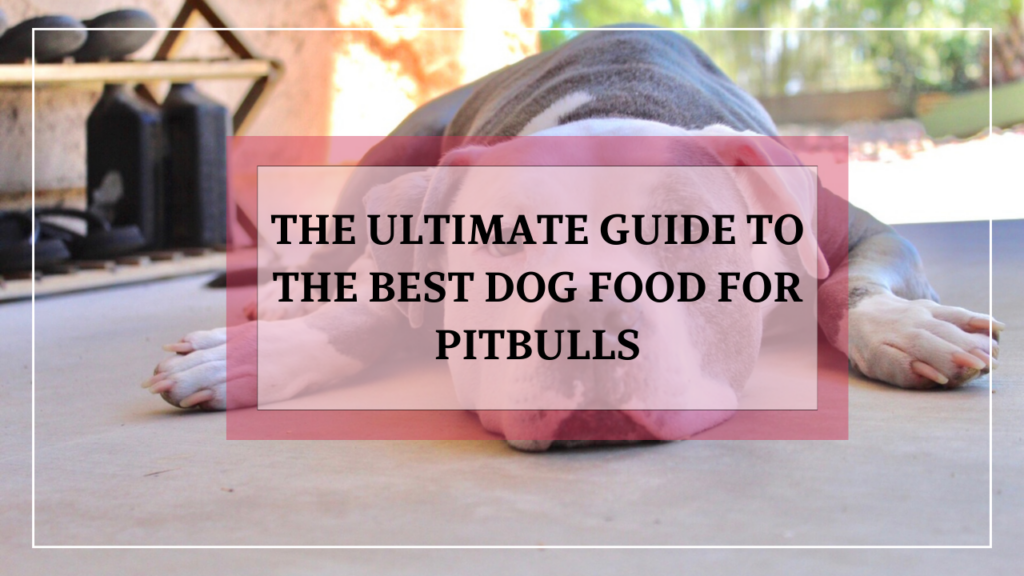Choosing the best dog food for Pitbulls is crucial for ensuring their optimal health and well-being. Proper nutrition supports their growth, energy levels, and overall quality of life. For Pitbulls, who are known for their muscular build and energetic nature, selecting a food that meets their specific dietary needs can make a significant difference in their health.
Pitbulls are a unique breed with distinct dietary requirements. Their robust physique demands a diet rich in high-quality proteins and essential nutrients. Additionally, a well-balanced diet can help prevent common health issues such as skin allergies, joint problems, and digestive issues. By understanding what makes the best dog food for Pitbulls, you can make informed decisions that contribute to their long-term health and happiness.
In this guide, we will delve into the nutritional needs of Pitbulls, highlight key factors in choosing their food, and provide recommendations for the best products on the market. Whether you’re a new Pitbull owner or looking to refine your dog’s diet, this comprehensive guide will offer valuable insights and practical advice.
What Makes Pitbulls Unique?
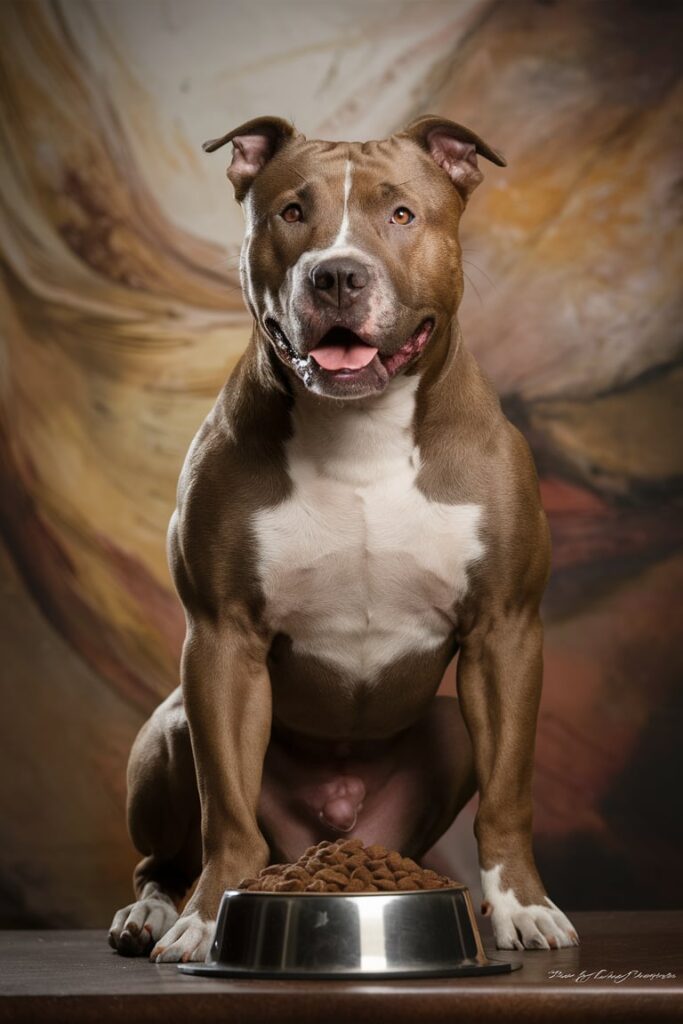
Understanding Pitbulls’ Dietary Needs
Pitbulls, known for their muscular and athletic build, have specific dietary needs that differ from other dog breeds. Their diet must support their active lifestyle and maintain their strong physique.
Nutritional Requirements for Pitbulls:
- High-Quality Protein:
- Why It’s Important: Pitbulls require a diet rich in protein to support muscle growth and repair. Proteins are the building blocks of muscles and are crucial for maintaining a healthy body structure.
- Sources: Look for dog foods that list real meat, such as chicken, beef, or fish, as the first ingredient. These sources provide essential amino acids that Pitbulls need.
- Healthy Fats:
- Why It’s Important: Fats provide a concentrated source of energy, which is essential for active Pitbulls. They also support skin and coat health, and provide essential fatty acids like Omega-3 and Omega-6.
- Sources: Good fats can be found in ingredients like fish oil, chicken fat, and flaxseed.
- Digestible Carbohydrates:
- Why It’s Important: Carbohydrates are a vital source of energy and help in maintaining a healthy digestive system. However, the focus should be on easily digestible carbs.
- Sources: Sweet potatoes, brown rice, and oats are excellent sources of carbohydrates that are gentle on a Pitbull’s digestive system.
- Vitamins and Minerals:
- Why They’re Important: Vitamins and minerals support various bodily functions, including immune system health, bone development, and overall vitality.
- Sources: Look for dog foods that include a mix of vegetables, fruits, and fortified nutrients.
Comparison Table: Essential Nutrients for Pitbulls
| Nutrient | Importance | Ideal Sources |
| Protein | Muscle development, repair | Chicken, beef, fish |
| Healthy Fats | Energy, skin and coat health | Fish oil, chicken fat, flaxseed |
| Carbohydrates | Energy, digestive health | Sweet potatoes, brown rice, oats |
| Vitamins & Minerals | Overall health and vitality | Vegetables, fruits, fortified nutrients |
How Age Influences Dietary Needs
The dietary needs of Pitbulls change throughout their life stages. Understanding these changes helps in selecting the most appropriate food for each stage of their life.
- Puppies:
- Nutritional Focus: Growth and development. High protein and fat content to support rapid growth and high energy levels.
- Food Type: Puppy-formulated foods that are rich in essential nutrients and have appropriate calorie content.
- Adults:
- Nutritional Focus: Maintenance of muscle mass and overall health. Balanced diet with moderate protein and fat.
- Food Type: Adult-formulated foods that provide a stable nutrient profile to maintain weight and energy.
- Seniors:
- Nutritional Focus: Joint health, weight management, and digestion. Lower calorie content and added joint supplements.
- Food Type: Senior-formulated foods with joint support ingredients and easier digestion.
Age-Specific Nutritional Needs for Pitbulls
| Life Stage | Nutritional Focus | Food Characteristics |
| Puppy | Growth, development | High protein, high fat, calorie-dense |
| Adult | Maintenance, health | Balanced protein, moderate fat |
| Senior | Joint health, weight management | Reduced calories, joint supplements |
Common Health Concerns for Pitbulls
Pitbulls are prone to specific health issues that can be influenced by diet. Addressing these through proper nutrition can help manage or prevent these conditions.
- Skin Allergies:
- Dietary Impact: Allergies can be aggravated by certain food ingredients. A diet with limited ingredients and hypoallergenic options can be beneficial.
- Recommended Foods: Foods with novel protein sources like lamb or duck.
- Joint Problems:
- Dietary Impact: Joint issues, including arthritis, can benefit from foods rich in omega fatty acids and glucosamine.
- Recommended Foods: Foods with added glucosamine and chondroitin, and omega-3 fatty acids.
- Digestive Issues:
- Dietary Impact: Sensitive stomachs or digestive issues can be managed with easily digestible ingredients and fiber.
- Recommended Foods: Foods with high-quality fiber sources like pumpkin or brown rice.
Key Considerations for Selecting Pitbull Dog Food
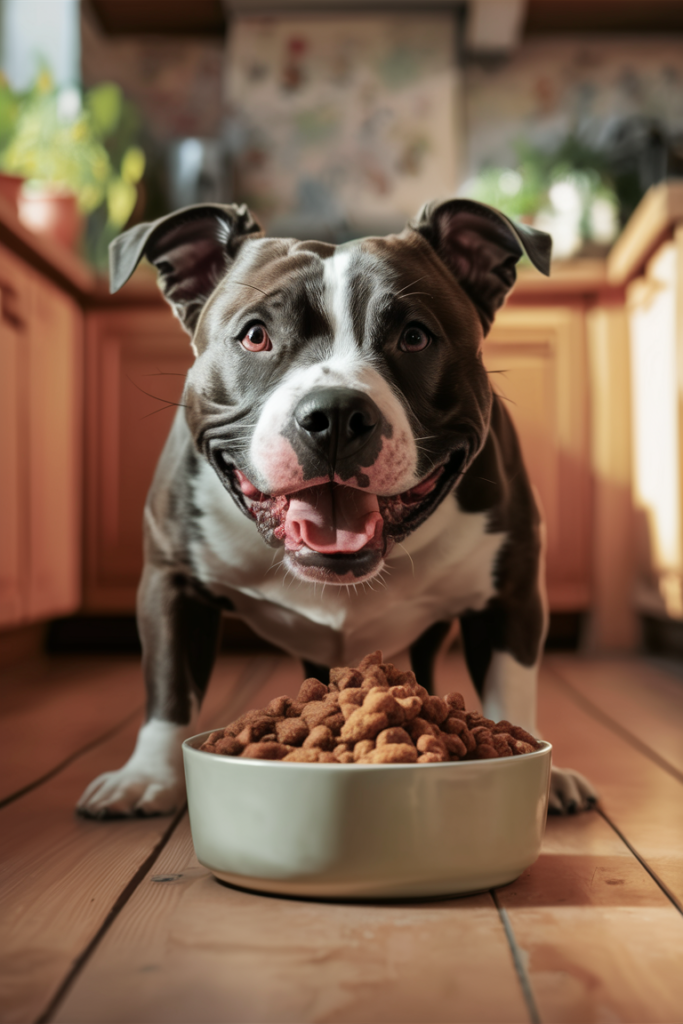
Choosing the best dog food for Pitbulls involves several important factors. Ensuring that the food meets their specific nutritional needs and supports their health is crucial. Here’s a guide to help you select the most appropriate food for your Pitbull.
Essential Nutrients for Pitbulls
1. High-Quality Protein:
- Why It Matters: Protein is essential for muscle development and repair, especially important for Pitbulls due to their muscular build. High-quality proteins provide the necessary amino acids for optimal health.
- Recommended Sources: Chicken, beef, lamb, fish. Look for dog foods where these are the primary ingredients, as they offer the best nutritional value.
2. Healthy Fats:
- Why It Matters: Fats are a crucial energy source and contribute to a healthy coat and skin. They also provide essential fatty acids like Omega-3 and Omega-6.
- Recommended Sources: Fish oil, chicken fat, flaxseed. These sources are beneficial for maintaining a healthy coat and skin, as well as overall energy levels.
3. Digestible Carbohydrates:
- Why It Matters: Carbohydrates provide energy and support a healthy digestive system. It’s important to choose carbohydrates that are easily digestible to prevent gastrointestinal issues.
- Recommended Sources: Sweet potatoes, brown rice, oats. These options are gentle on the digestive system and provide sustained energy.
4. Vitamins and Minerals:
- Why They Matter: Vitamins and minerals are vital for various bodily functions, including immune support, bone health, and overall vitality.
- Recommended Sources: Vegetables (like spinach and carrots), fruits (such as blueberries and apples), and fortified nutrients. These ingredients help maintain a balanced diet and support overall health.
Ingredients to Prioritize
1. Real Meat as the First Ingredient:
- Why It’s Important: Real meat should be the first ingredient listed on the label, as it provides high-quality protein essential for muscle health.
- Examples: Chicken, beef, fish. Avoid foods where meat by-products are the main ingredient.
2. Healthy Fats and Oils:
- Why They’re Important: Healthy fats are crucial for energy and maintaining a shiny coat. Look for foods that include sources of Omega-3 and Omega-6 fatty acids.
- Examples: Fish oil, chicken fat, flaxseed oil.
3. Whole Grains and Vegetables:
- Why They’re Important: Whole grains provide fiber and essential nutrients, while vegetables offer vitamins and minerals.
- Examples: Brown rice, sweet potatoes, carrots, spinach.
Ingredients to Avoid
1. Common Allergens:
- Why to Avoid: Some Pitbulls may have allergies to common ingredients like corn, soy, and wheat. These allergens can cause digestive issues or skin problems.
- Examples: Corn, soy, wheat.
2. Artificial Additives and Preservatives:
- Why to Avoid: Artificial additives and preservatives can contribute to health problems and may not be easily digestible.
- Examples: BHA, BHT, artificial colors and flavors.
3. Fillers and By-Products:
- Why to Avoid: Fillers and by-products provide little nutritional value and can be difficult for dogs to digest.
- Examples: Meat by-products, corn gluten meal.
Grain-Free vs. Grain-Inclusive Diets
1. Grain-Free Diets:
- Benefits: Grain-free diets can be beneficial for dogs with grain allergies or sensitivities. They often feature high-quality proteins and vegetables.
- Drawbacks: Some grain-free diets have been linked to certain health issues, such as dilated cardiomyopathy (DCM), especially if they are not properly balanced.
2. Grain-Inclusive Diets:
- Benefits: Grain-inclusive diets provide a balanced source of carbohydrates and fiber. They are generally well-tolerated by most dogs and support digestive health.
- Drawbacks: Some dogs may develop allergies to grains, so it’s essential to monitor your Pitbull’s response to these diets.
Choosing the Right Type:
- Consult with a Veterinarian: A vet can help determine the best diet based on your Pitbull’s specific needs and health conditions.
- Observe Your Dog’s Response: Monitor how your Pitbull reacts to the diet, including any changes in coat condition, energy levels, or digestive health.
Recommended Dog Foods for Pitbulls
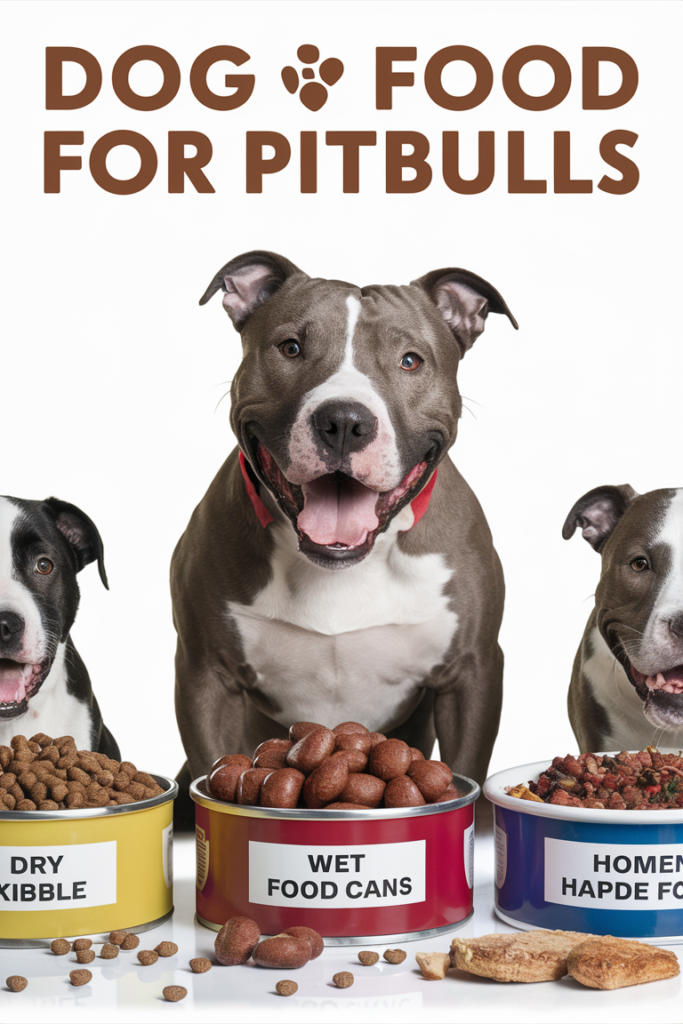
Finding the best dog food for Pitbulls involves evaluating various options that meet their nutritional needs and support their health. Here are some top recommendations for dry, wet, and homemade dog foods, as well as supplements that can benefit Pitbulls.
Top Dry Dog Foods for Pitbulls
1. Brand 1: Royal Canin Size Health Nutrition Large Adult
- Benefits:
- Specifically formulated for large breeds, including Pitbulls.
- Includes high-quality proteins for muscle maintenance.
- Enhanced with omega fatty acids for skin and coat health.
- Features:
- Real chicken as the first ingredient.
- Balanced nutrients for overall health.
- Supports joint health with added glucosamine and chondroitin.
- Potential Drawbacks:
- Higher price point compared to other brands.
- Contains some grains which may not be suitable for all Pitbulls.
2. Brand 2: Blue Buffalo Wilderness High Protein
- Benefits:
- High protein content to support muscular growth.
- Grain-free formula suitable for dogs with grain sensitivities.
- Includes antioxidant-rich fruits and vegetables for overall health.
- Features:
- Real deboned chicken as the first ingredient.
- No artificial preservatives, colors, or flavors.
- Added LifeSource Bits for a boost of vitamins and minerals.
- Potential Drawbacks:
- Some Pitbulls may experience digestive issues with high-protein formulas.
- Premium pricing.
3. Brand 3: Nutro Ultra Grain-Free
- Benefits:
- Multi-protein blend for a balanced diet.
- Rich in omega fatty acids for coat and skin health.
- Formulated with a blend of 15 superfoods for additional nutrients.
- Features:
- Includes real chicken, lamb, and salmon.
- Free from artificial flavors and preservatives.
- Enriched with antioxidants for immune health.
- Potential Drawbacks:
- May be more expensive than standard brands.
- Some Pitbulls may prefer different flavors.
Best Wet Dog Foods for Pitbulls
1. Brand 1: Hill’s Science Diet Adult Sensitive Stomach & Skin
- Benefits:
- Formulated for dogs with sensitive stomachs and skin.
- Contains easily digestible ingredients.
- Rich in omega fatty acids to support skin health.
- Features:
- Real chicken as the primary ingredient.
- No artificial colors, flavors, or preservatives.
- Includes prebiotic fiber for digestive health.
- Potential Drawbacks:
- Higher cost compared to some other wet food options.
- Limited variety of flavors.
2. Brand 2: Merrick Grain-Free Texas Beef & Sweet Potato
- Benefits:
- High-quality beef as the first ingredient.
- Grain-free formula with added vitamins and minerals.
- Suitable for dogs with grain sensitivities.
- Features:
- Contains beef, sweet potatoes, and peas.
- Free from artificial additives and preservatives.
- Rich in protein for muscle health.
- Potential Drawbacks:
- Some Pitbulls might find the flavor too strong.
- Premium pricing.
3. Brand 3: Pedigree Chopped Ground Dinner
- Benefits:
- Affordable and widely available.
- Balanced nutrition for general health.
- Variety of flavors to suit different tastes.
- Features:
- Contains chicken, beef, or lamb.
- Includes vitamins and minerals for a complete diet.
- Added fiber for digestive health.
- Potential Drawbacks:
- Contains some fillers and artificial additives.
- Lower protein content compared to premium brands.
Homemade Dog Food Recipes for Pitbulls
1. Recipe 1: Chicken and Sweet Potato Stew
- Ingredients:
- 2 cups of chicken breast (cooked and shredded)
- 1 cup of sweet potatoes (diced)
- 1/2 cup of carrots (diced)
- 1/4 cup of peas
- 1 tablespoon of olive oil
- Preparation:
- Cook chicken breast and shred.
- Boil sweet potatoes, carrots, and peas until tender.
- Mix all ingredients together with olive oil.
- Cool before serving.
- Benefits:
- High in protein and vitamins.
- Easy on the digestive system.
- Homemade and free from artificial additives.
2. Recipe 2: Beef and Vegetable Medley
- Ingredients:
- 2 cups of ground beef (cooked)
- 1/2 cup of green beans (chopped)
- 1/2 cup of pumpkin (cooked)
- 1/4 cup of spinach (chopped)
- 1 tablespoon of fish oil
- Preparation:
- Cook ground beef until browned.
- Steam green beans and pumpkin.
- Mix all ingredients with fish oil.
- Cool before serving.
- Benefits:
- Provides essential fatty acids and proteins.
- Rich in fiber and vitamins.
- No artificial ingredients or preservatives.
3. Recipe 3: Turkey and Rice Mix
- Ingredients:
- 2 cups of ground turkey (cooked)
- 1 cup of brown rice (cooked)
- 1/2 cup of carrots (diced)
- 1/4 cup of peas
- 1 tablespoon of flaxseed oil
- Preparation:
- Cook ground turkey and brown rice separately.
- Boil carrots and peas.
- Mix all ingredients with flaxseed oil.
- Cool before serving.
- Benefits:
- Balanced protein and carbohydrate content.
- Supports healthy skin and coat.
- Easy to prepare and digest.
Top Supplements for Pitbulls
1. Glucosamine and Chondroitin Supplements
- Purpose: Supports joint health and mobility.
- Recommended Brand: Dasuquin with MSM.
- Benefits: Helps manage joint pain and inflammation.
2. Omega-3 Fatty Acid Supplements
- Purpose: Supports skin health and reduces inflammation.
- Recommended Brand: Zesty Paws Omega Bites.
- Benefits: Improves coat condition and overall skin health.
3. Probiotics
- Purpose: Supports digestive health and immunity.
- Recommended Brand: Nutramax Proviable.
- Benefits: Aids in digestion and enhances gut health.
How to Transition Your Pitbull to a New Dog Food
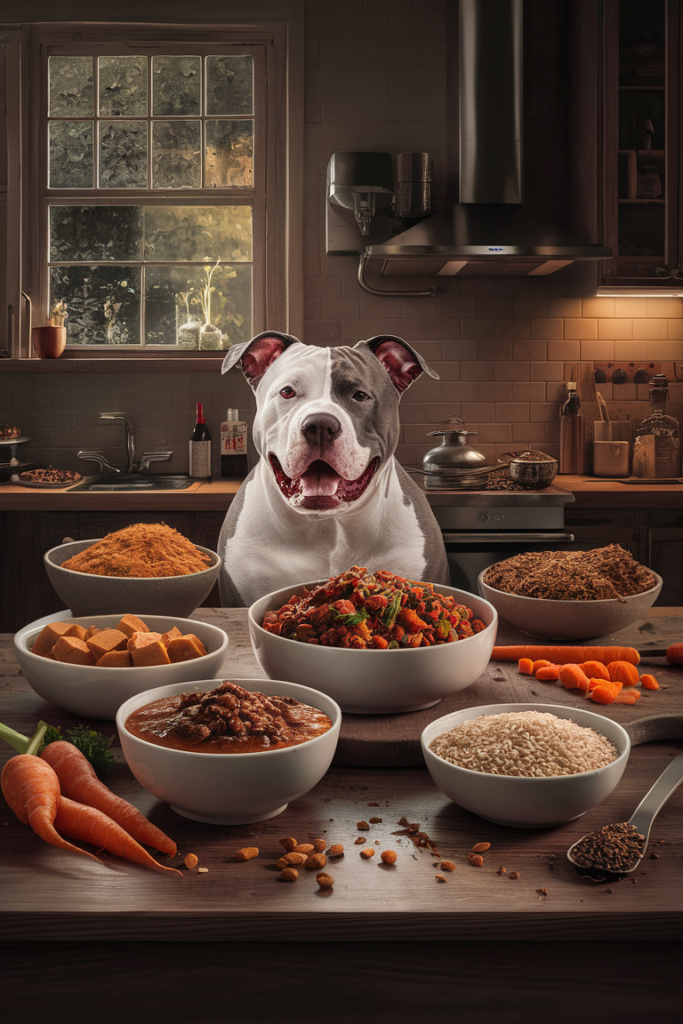
Switching your Pitbull’s diet can be a delicate process. A sudden change in food can lead to digestive upset or reluctance to eat. To ensure a smooth transition, follow these guidelines.
Steps to Transition Your Pitbull to a New Food
1. Gradual Introduction
- Why It’s Important: Gradually introducing the new food helps your Pitbull’s digestive system adjust and reduces the risk of gastrointestinal issues.
- How to Do It:
- Day 1-3: Mix 25% of the new food with 75% of the old food.
- Day 4-6: Increase to 50% of the new food and 50% of the old food.
- Day 7-10: Mix 75% of the new food with 25% of the old food.
- Day 11: Feed 100% of the new food.
2. Monitor Your Pitbull’s Reaction
- What to Watch For:
- Digestive Issues: Look for signs of diarrhea, vomiting, or changes in stool consistency.
- Appetite Changes: Ensure your Pitbull is eating the new food and showing interest.
- Allergic Reactions: Watch for itching, skin rashes, or other signs of allergies.
3. Adjust Portion Sizes
- Why It’s Necessary: New foods might have different calorie counts and nutrient densities. Adjust portions as needed to avoid overfeeding or underfeeding.
- How to Adjust:
- Follow Feeding Guidelines: Check the feeding recommendations on the new food’s packaging.
- Consult Your Vet: If unsure about portion sizes, your veterinarian can provide guidance based on your Pitbull’s weight and activity level.
4. Be Patient and Consistent
- Why Patience Matters: The transition period is crucial for your Pitbull’s adjustment. Rushing the process can lead to digestive upset.
- Consistency Tips:
- Stick to the Transition Plan: Follow the gradual introduction plan strictly.
- Provide Fresh Water: Ensure your Pitbull has access to clean, fresh water at all times.
Common Challenges and Solutions
1. Digestive Upset
- Problem: Diarrhea or vomiting during the transition.
- Solution: Slow down the transition process and mix smaller amounts of the new food with the old food.
2. Loss of Appetite
- Problem: Reluctance to eat the new food.
- Solution: Try warming the food slightly or mixing in a small amount of a favorite treat or topping to entice your Pitbull.
3. Allergic Reactions
- Problem: Skin irritation or other allergy symptoms.
- Solution: Discontinue the new food and consult your veterinarian. They may recommend a different formula or conduct allergy testing.
Tips for a Successful Transition
1. Choose a High-Quality Food
- Why It Helps: Starting with a high-quality, well-formulated food reduces the likelihood of adverse reactions.
- Recommendation: Opt for foods with a good balance of protein, fats, and essential nutrients.
2. Maintain a Routine
- Why It Matters: Keeping feeding times and routines consistent can help your Pitbull adjust to the new food more easily.
- Tip: Stick to regular feeding schedules and avoid giving extra treats during the transition period.
3. Consult Your Veterinarian
- Why It’s Beneficial: Your vet can provide personalized advice based on your Pitbull’s specific health needs and dietary requirements.
- Recommendation: Schedule a vet visit before and during the transition if you have concerns or questions.

Hi, I’m Ali Tarek, the founder of Animalsman. I’ve always been passionate about pets, especially dogs and cats, and I created this website to share practical tips, easy recipes, and helpful care advice for fellow pet lovers. My goal is to make pet care simple, enjoyable, and accessible for everyone. When I’m not writing or curating content, you’ll usually find me spending time with my furry friends or learning new ways to keep them happy and healthy.

